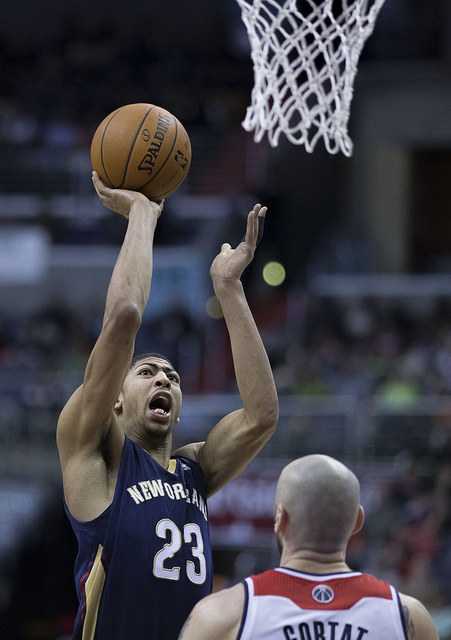
Image via Flickr/keithallison
According to most, the conversation for this season’s MVP is down to two candidates: Stephen Curry and James Harden. A race that had four or five guys in the conversation all year has been whittled down to two, in large part due to the fact that those two candidates were the focal points of teams that finished 1 and 2 in the Western Conference. But MVP is not a team award, it is an individual one that should reflect the accomplishments of the players, not the team as a whole.
Now, I get it. A part of a player’s value to a team can be reflected in the record of his team, but that should only be one of the factors.
If you look at the history of the MVP award, all of the winners have come from teams with a top-four record, and nearly 90% of winners have come from a team with one of the top two records in the league. Now, it might just happen to line up that the best player in the league led his team to a top two record almost every year, but I think this statistic shows a bias more than anything — a bias against considering anything that strays from tradition.
The award should not be for the best player on the best team. It should be for the best player. Period.
There’s also the argument that we should determine MVP by trying to project what that player’s team would look like with an average player at his position, and then see which team of the MVP candidates has the highest variance. Well, first of all, that’s still just a subjective projection that a thousand people will see a thousand different ways. And second, if you replace any player with a different one, the team operates differently. For example, if you replace James Harden with Arron Afflalo, the Rockets aren’t going to run heavy isolation or pick and roll. They will go down to Dwight Howard in the post and work through him instead. Players are not just positions or stats. They are skill sets, and if a coach gets a different set of skills to work with, he will create a different strategy and dynamic on the court. So, long story short, this should not be the way we decide the MVP either.
The Greatest Overall Impact
The MVP should be decided solely by finding the player who has the greatest overall impact on the games he plays over the course of a season. Overall impact takes into account every possession on both sides of the court, and takes into account both direct and indirect impact. When you make that the criteria for MVP, there can be only one winner for the 2014-15 NBA season: Anthony Davis.
Despite playing at a much slower pace than all of his MVP competitors, and having fewer possessions, Anthony Davis was the only player in the league this season to finish in the top-10 in multiple categories on both the offensive and defensive ends.
On offense, Davis ranks 4th in points and 7th in field goal percentage, while also finishing top-20 in offensive rebounds.
On defense, Davis ranks 1st in blocks and 6th in defensive rebounds, to go along with the fact that he was top-30 in steals (and 4th among big men).
Anthony Davis scores with incredible efficiency, and if he doesn’t get the shot, he has a good opportunity to create another possession by cleaning up the misses by his teammates. Davis also has an incredible indirect effect on the offense, as he gets teammates shots that they otherwise wouldn’t get with another big man in his spot.
The Pelicans lead the league in percentage of open looks relative to the number of seconds they have the ball in their hands. And according to all the data at our disposal thanks to SportVU cameras, we know Anthony Davis is responsible for that.
Look no further than Quincy Pondexter, who got to play this season both with and without Anthony Davis. Prior to coming to New Orleans, Pondexter was shooting 35% from the floor and 23% from three. In the 696 minutes he has spent on the court with Anthony Davis since coming to New Orleans, he is shooting 44% from the floor and 46% from three. According to the NBA.com stats tool, his number of wide open 3-point attempts have more than doubled (per minute) since coming to New Orleans to play with Anthony Davis.
On the defensive end, Anthony Davis is an impact player that can end a possession in a multitude of ways. He gets 12.1 defensive Steboulks a game – that is defensive rebounds, blocks, and steals combined. And while every single block does not result in a change of possession (more than 60% do), Davis still makes an much bigger impact in this area than the other MVP candidates. When you consider that defensive possessions comprise 50% of all possessions in a game, and that Davis is around 200% more likely to end an opponent’s possession than any of his competitors, this should give Davis an enormous defensive edge when it comes to MVP consideration.
Historic Player Efficiency
I can sit here and site his league leading (and historic) PER, but that really is just a summary of everything listed above. Davis impacts the game in a multitude of ways, and what makes it even more impressive is how often he does it despite the limited opportunities he gets. If he was on a team like Houston, for instance, he would get an extra 12 possessions per game (between both ends) to score more, to block more, to rebound more, and to steal more. Right now, there is about a 6% difference between him and the second best player in terms of PER. Those extra 12 possessions would boost his numbers to unprecedented levels — the statistical gap between him and the rest of the league would be massive.
Again, the MVP is the guy who makes the largest overall impact on the game, and the game includes both sides of the court. Anthony Davis — more than any other player in the league — ends possessions in a positive way for his team. While he might lag slightly behind Westbrook, Harden, and Curry on the offensive end as far as direct impact produced, his indirect impact makes up for that, and the number of possessions he ends on the other side dwarfs anything the other candidates produce.
Ergo, Anthony Davis is the 2014-2015 NBA MVP, regardless of how the voting turns out.


